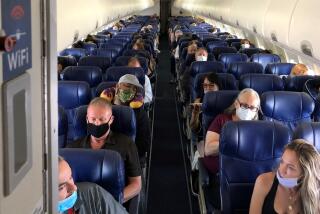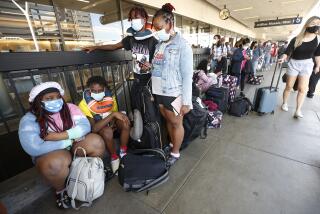Hazardous on Airliners, Too
- Share via
Pipe smokers and cigar smokers were told years ago that they could no longer light up on airline flights, since the smoke that they produced bothered other people. Now Congress wants to extend this prohibition to cigarette smokers as well. Last summer the House approved a measure to ban cigarette smoking for the next three years on all domestic commercial airline flights of two hours or less. That would cover nearly 80% of all scheduled flights. The Senate, under threat of a filibuster from Jesse Helms (R-N.C.) and other spokesmen of the tobacco lobby, has been forced to adopt a less stringent approach. It would impose a two-year smoking ban on airliner flights of 90 minutes or less. That would affect about 70% of all flights. A conference committee will reconcile the two measures.
Opponents of the smoking ban, in both Congress and the Reagan Administration, contend that evidence of the health effects of smoking on nonsmokers is still lacking. This recalls the claim clung to by the tobacco industry for so long, even as mortality rates from lung and other respiratory-system cancers continued to climb, that the only link between smoking and these diseases was “statistical.” There is in fact growing evidence that nonsmokers’ health can be affected by exposure to second-hand smoke. The confined space of an airliner, even with separate smoking and non-smoking sections, represents an environment where it is almost impossible to avoid the toxic byproducts of smoking.
There are early signs that the limitations on smoking that have lately been imposed in many offices and public buildings have prompted some smokers to smoke less, and others to quit entirely. The ban on smoking in airliners might encourage similar behavioral changes. A report from the Centers for Disease Control underscores the importance of such changes. Released the day after the Senate’s smoking vote, the CDC report shows that smoking-related deaths in the United States rose from 270,000 in 1980 to more than 315,000 in 1984. Among those, the CDC said, were 15,000 infants whose mothers smoked during pregnancy. Jesse Helms, who professes to worry about the rights of the young and the unborn, might want to worry some about that.
More to Read
Sign up for Essential California
The most important California stories and recommendations in your inbox every morning.
You may occasionally receive promotional content from the Los Angeles Times.













